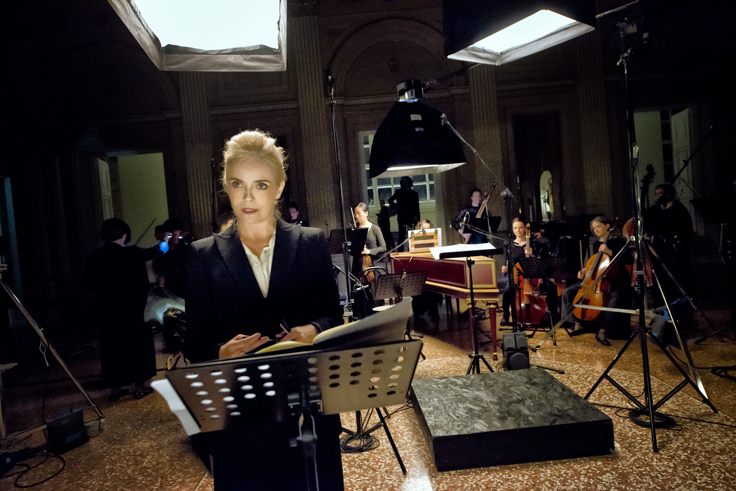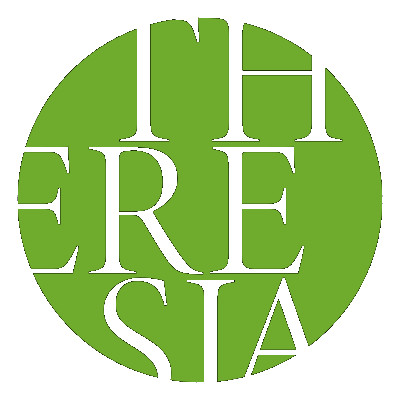
In un progetto complesso come Zoroastro, in cui musica e cinema si fondono negli spazi maestosi del Teatro Galli, la voce attoriale che traccia attraverso le parole i contorni del grande affresco è quella di Galatea Ranzi, figura forte e lieve al contempo, chiamata a interpretare testi di Casanova, tratti dall’autobiografia del letterato veneziano e dalla traduzione che Casanova fece del libretto dell’opera.
Una figura familiare, quella di Casanova, per Galatea Ranzi, che in un incontro con la stampa prima della replica dello spettacolo in Sala Galli spiega: “Casanova lo incontro ogni dieci anni, è un personaggio che mi accompagna. In precedenza ho interpretato ‘Il ritorno di Casanova’ di Arthur Schnitzler e il testo dedicato a Casanova da Marina Tsvetaeva. Forse è più di una coindicenza…”
Per Galatea Ranzi questo Zoroastre è “un affascinante intreccio di arti: c’è la musica, il cinema, il teatro, l’architettura, la danza. In effetti non c’è un termine per definire questo lavoro, io lo chiamo ancora una ‘cosa’. Ricordo quando mi ha contattato inizialmente Alessandro Taverna, sono rimasta affascinata: poi c’è stato un fitto dialogo con il regista Gianni Di Capua, con cui si è costruito tutto.”
E del rapporto con il regista Galatea Ranzi spiega: “Agli inizi della mia carriera un regista disse di me: ‘Galatea non chiede il perchè ma chiede il come.’ Le cose per me sono ancora così: con il regista deve scattare deve scattare un’empatia, io assorbo tutto, sono uno strumento nelle mani del regista.”
Nel podcast l’intervista che Galatea Ranzi ha concesso a Theresia.
[highlighted_text]English translation by Charlotte Michi[/highlighted_text]
Galatea Ranzi in the film-concert Zoroastre gives voice to Casanova reading extracts of his autobiography and of the translations he made of the libretto of the opera.
In this circumstance, which shape has the figure of Casanova for you? How are you interpreting it?
For sure his eclecticism comes out. He is a sophisticated man, prepared, inquiring, very vital, really interested in so many things. I am trying to convey his being passionate about life. [In on of the text I read] Csanova says that at 73, nearly on the verge of death, he is writing his memoires with great fun. I think this is a precious teaching.
Your job as an actress unfolds between cinema, theatre and television. The director of this film-concert, Gianni Di Capua, says that he wanted you to be present in this project also for your versatility. How do you think these three worlds interweave in this moment in this work you are doing on Zoroastre?
I think they interweave and that this will follow-up. I think these forms of expression are still too much separated and the occasions in which they can exalt each other are still few. I think there is still so much to do in this way. This opportunity [of taking part in this project] is quite special and I am happy I can share it.
Of course in this project music is very important. It’s dedicated to an opera and in based on a live music performance. What is you’re relationship with music?
Music is 80% of our lives. We are surrounded by music, unfortunately most of the time terrible music. So, when it occurs, we have to seize on the opportunity to be filled of good quality music. Professionally I have [studied music] since the beginning thanks to the beautiful lessons of Paolo Terni that has been my teacher and trait-d’union between music and theatre, between music and word. This fusion between music and word is also the origin of poetry: the greek tragedy was sung, provencal rymes of the beginning of the Italian literature were all in music, we know very well madrigals. There is a tradition, an archetype we have to recover, develop and analyze.
What effect did the music of Rameau you listened yesterday have on you?
Wonderful, the young musicians of this orchestra are very good, so clean, so transparent. Till now I did not have the occasion [to listen to this music] as there is no recording of this score and I was really inquiring as I would have to interact with this music. It was really magic, the opera talks about magic.
Alessandro Taverna told us that the idea for a such complex project is born from his passion for Fellini; but Fellini remains a bit subtext, he is not appointed, he is not a concrete part of the plot. Do you find a Fellinian spirit in all this operation?
The cinema in the cinema, the theatre in the cinema, this is already an element used by Fellini, think for example at the film 8 and ½. Yes, you can here Fellini is present [in this film-concert] in a strong way.


